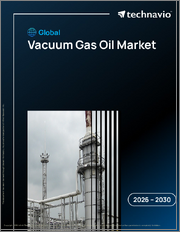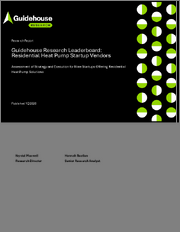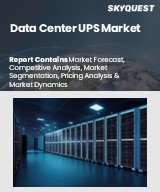
|
시장보고서
상품코드
1642757
무정전전원장치(UPS) 시스템 시장 보고서 : 유형별, 정격별, 최종 사용자별, 지역별(2025-2033년)Uninterrupted Power Supply (UPS) System Market Report by Type (Online, Offline, Line Interactive), Rating (<5KVA, 5-<50 KVA, 50-200 KVA, >200 KVA), End User (Residential, Industrial, Commercial), and Region 2025-2033 |
||||||
세계의 무정전전원장치(UPS) 시스템 시장 규모는 2024년 85억 달러에 달했습니다. IMARC Group은 향후 시장이 2033년까지 127억 달러에 이를 전망이며, 2025년부터 2033년까지 4.35%의 성장률(CAGR)을 나타낼 것으로 예측했습니다.
무정전전원장치(UPS) 시스템은 정전 시 사용되는 비상 전원 백업 솔루션입니다. UPS는 배터리 구동 시간이 짧아 컴퓨터, 데이터센터, TV 시스템과 같은 활성 장비 및 장치를 안전하게 종료하기에 충분합니다. 일반적으로 사용할 수 있는 UPS 시스템에는 전압 및 주파수 독립형(VFI), 전압 독립적(VI), 전압 의존형(VD)이 있습니다. 이들은 전력을 저장하기 위한 플라이휠, 배터리, 슈퍼커패시터 등으로 구성되어 있습니다. 기존에 사용된 시스템에 비해 UPS 시스템은 조용하고 입력 전원 차단에 대한 즉각적인 보호를 제공하고 운영 중단 및 데이터 유출을 방지하기 위해 일관된 대기 전원을 공급합니다. 그 결과, UPS 시스템은 헬스케어 센터, 전기 POS 단말, 통신 센터 등에서 널리 사용되고 있습니다.
무정전전원장치(UPS) 시스템 시장 동향 :
신뢰할 수 있는 전원 솔루션에 대한 수요가 산업 전반에 걸쳐 증가하고 있는 것이 시장 성장을 가속하는 주요 요인 중 하나입니다. UPS 시스템은 대규모 제조 시설을 관리하고 전력 부족을 방지하기 위해 무정전전원 공급에 널리 사용됩니다. 또한, 주거 및 상업 시설에서의 UPS 시스템의 광범위한 채용은 시장 성장의 추진력이 되고 있습니다. UPS는 스마트 전자 장치를 전압 변동이나 갑작스런 정전으로부터 보호하여 장비의 정밀 부품을 손상시킬 수 있습니다. 이에 따라 정보기술(IT) 업무를 효율적으로 수행하기 위해 전력 다운타임을 제로로 하고자 하는 수요가 높아지고 있는 것도 시장의 성장에 기여하고 있습니다. 또한 고온 동작이 가능한 리튬 이온(Li-ion) 전지의 통합 등 다양한 제품 혁신도 성장을 가속하는 요인이 되고 있습니다. 종래부터 사용되고 있는 밸브식 납 축전지(VRLA)에 비해, 이러한 신형 전지는 동작 사이클이 길고, 효율이 높습니다. 그 밖의 요인으로는 공장 자동화 요구 증가, 전자 및 통신 산업의 현저한 성장 등을 들 수 있으며, 시장의 성장을 뒷받침할 것으로 예상됩니다.
이 보고서에서 다루는 주요 질문
- 세계의 무정전전원장치(UPS) 시스템 시장 규모는?(2024년)
- 세계의 무정전전원장치(UPS) 시스템 시장 성장률은?(2025-2033년)
- 세계의 무정전전원장치(UPS) 시스템 시장을 견인하는 주요 요인은?
- 세계의 무정전전원장치(UPS) 시스템 시장에 대한 COVID-19의 영향은?
- 세계 무정전전원장치(UPS) 시스템 시장의 유형별 내역은?
- 세계 무정전전원장치(UPS) 시스템 시장의 정격별 내역은?
- 세계 무정전전원장치(UPS) 시스템 시장의 최종 사용자별 내역은?
- 세계 무정전전원장치(UPS) 시스템 시장의 주요 지역은?
- 세계의 무정전전원장치(UPS) 시스템 시장에서 주요 기업은?
목차
제1장 서문
제2장 조사 범위 및 조사 방법
- 조사의 목적
- 이해관계자
- 데이터 소스
- 1차 정보
- 2차 정보
- 시장 추정
- 상향식 접근
- 하향식 접근
- 조사 방법
제3장 주요 요약
제4장 서문
- 개요
- 주요 업계 동향
제5장 세계의 무정전전원장치(UPS) 시스템 시장
- 시장 개요
- 시장 실적
- COVID-19의 영향
- 시장 예측
제6장 시장 내역 : 유형별
- 온라인
- 시장 동향
- 시장 예측
- 오프라인
- 시장 동향
- 시장 예측
- 라인 인터랙티브
- 시장 동향
- 시장 예측
제7장 시장 내역 : 정격별
- 5KVA 미만
- 시장 동향
- 시장 예측
- 5-50KVA
- 시장 동향
- 시장 예측
- 50-200KVA
- 시장 동향
- 시장 예측
- 200KVA 이상
- 시장 동향
- 시장 예측
제8장 시장 내역 : 최종 사용자별
- 주택
- 시장 동향
- 시장 예측
- 산업
- 시장 동향
- 시장 예측
- 상업
- 시장 동향
- 시장 예측
제9장 시장 내역 : 지역별
- 북미
- 미국
- 캐나다
- 아시아태평양
- 중국
- 일본
- 인도
- 한국
- 호주
- 인도네시아
- 기타
- 유럽
- 독일
- 프랑스
- 영국
- 이탈리아
- 스페인
- 러시아
- 기타
- 라틴아메리카
- 브라질
- 멕시코
- 기타
- 중동 및 아프리카
- 시장 동향
- 시장 내역 : 국가별
- 시장 예측
제10장 SWOT 분석
- 개요
- 강점
- 약점
- 기회
- 위협
제11장 밸류체인 분석
제12장 Porter's Five Forces 분석
- 개요
- 구매자의 협상력
- 공급기업의 협상력
- 경쟁도
- 신규 참가업체의 위협
- 대체품의 위협
제13장 가격 분석
제14장 경쟁 구도
- 시장 구조
- 주요 기업
- 주요 기업 프로파일
- ABB Ltd.
- AEG Power Solutions BV(3W Power SA)
- CyberPower Systems Inc.
- Delta Electronics Inc.
- Eaton Corporation
- Emerson Electric Co.
- Hitachi Hi-Rel Power Electronics Private Limited(Hitachi Ltd.)
- Huawei Technologies Co. Ltd.
- Legrand
- Microtek International Inc.
- Schneider Electric SE
- Shenzhen SORO Electronics Co. Ltd.
- Socomec
- Toshiba Corporation
The global uninterrupted power supply (UPS) system market size reached USD 8.5 Billion in 2024. Looking forward, IMARC Group expects the market to reach USD 12.7 Billion by 2033, exhibiting a growth rate (CAGR) of 4.35% during 2025-2033.
An uninterrupted power supply (UPS) system is an emergency power backup solution used in case of power failures. It has a short on-battery run-time, which is sufficient for securely shutting down active equipment and devices, such as computers, data centers and television systems. Some of the commonly available UPS systems include voltage and frequency independent (VFI), voltage-independent (VI) and voltage-dependent (VD) systems. They consist of flywheels, batteries and supercapacitors to store the power. In comparison to the traditionally used systems, UPS systems are silent, provide immediate protection against input power interruptions and consistent standby power supply to prevent operational disruption and data loss. As a result, UPS systems are widely used in healthcare centers, electric point of sales (PoS) terminals and telecommunication centers.
Uninterrupted Power Supply (UPS) System Market Trends:
The increasing demand for reliable power solutions across industries is one of the key factors driving the growth of the market. UPS systems are widely used for providing uninterrupted power supply to manage large-scale manufacturing facilities and prevent power shortages. Moreover, the widespread adoption of UPS systems across residential and commercial complexes is providing a thrust to the market growth. They aid in protecting smart electronic devices against voltage fluctuations and sudden power outages that can damage the sensitive components of the devices. In line with this, the rising demand for zero power downtime to effectively run information technology (IT) operations is also contributing to the growth of the market. Additionally, various product innovations, such as the integration of lithium-ion (Li-ion) batteries with high operating temperatures, are acting as other growth-inducing factors. In comparison to the traditionally used valve-regulated lead-acid (VRLA) batteries, these novel variants have longer operational cycles and higher efficiency. Other factors, including the increasing requirement for factory automation, along with significant growth in the electronics and telecommunication industries, are anticipated to drive the market toward growth.
Key Market Segmentation:
Breakup by Type:
Online
Offline
Line Interactive
Breakup by Rating:
<5KVA
5-<50 KVA
50-200 KVA
>200 KVA
Breakup by End User:
Residential
Industrial
Commercial
Breakup by Region:
North America
United States
Canada
Asia-Pacific
China
Japan
India
South Korea
Australia
Indonesia
Others
Europe
Germany
France
United Kingdom
Italy
Spain
Russia
Others
Latin America
Brazil
Mexico
Others
Middle East and Africa
Competitive Landscape:
The competitive landscape of the industry has also been examined along with the profiles of the key players being ABB Ltd., AEG Power Solutions B.V. (3W Power S.A.), CyberPower Systems Inc., Delta Electronics Inc., Eaton Corporation, Emerson Electric Co., Hitachi Hi-Rel Power Electronics Private Limited (Hitachi Ltd.), Huawei Technologies Co. Ltd., Legrand, Microtek International Inc., Schneider Electric SE, Shenzhen SORO Electronics Co. Ltd., Socomec and Toshiba Corporation.
Key Questions Answered in This Report
- 1. What was the size of the global uninterrupted power supply (UPS) system market in 2024?
- 2. What is the expected growth rate of the global uninterrupted power supply (UPS) system market during 2025-2033?
- 3. What are the key factors driving the global uninterrupted power supply (UPS) system market?
- 4. What has been the impact of COVID-19 on the global uninterrupted power supply (UPS) system market?
- 5. What is the breakup of the global uninterrupted power supply (UPS) system market based on the type?
- 6. What is the breakup of the global uninterrupted power supply (UPS) system market based on the rating?
- 7. What is the breakup of the global uninterrupted power supply (UPS) system market based on the end-user?
- 8. What are the key regions in the global uninterrupted power supply (UPS) system market?
- 9. Who are the key players/companies in the global uninterrupted power supply (UPS) system market?
Table of Contents
1 Preface
2 Scope and Methodology
- 2.1 Objectives of the Study
- 2.2 Stakeholders
- 2.3 Data Sources
- 2.3.1 Primary Sources
- 2.3.2 Secondary Sources
- 2.4 Market Estimation
- 2.4.1 Bottom-Up Approach
- 2.4.2 Top-Down Approach
- 2.5 Forecasting Methodology
3 Executive Summary
4 Introduction
- 4.1 Overview
- 4.2 Key Industry Trends
5 Global Uninterrupted Power Supply (UPS) System Market
- 5.1 Market Overview
- 5.2 Market Performance
- 5.3 Impact of COVID-19
- 5.4 Market Forecast
6 Market Breakup by Type
- 6.1 Online
- 6.1.1 Market Trends
- 6.1.2 Market Forecast
- 6.2 Offline
- 6.2.1 Market Trends
- 6.2.2 Market Forecast
- 6.3 Line Interactive
- 6.3.1 Market Trends
- 6.3.2 Market Forecast
7 Market Breakup by Rating
- 7.1 <5KVA
- 7.1.1 Market Trends
- 7.1.2 Market Forecast
- 7.2 5-<50 KVA
- 7.2.1 Market Trends
- 7.2.2 Market Forecast
- 7.3 50-200 KVA
- 7.3.1 Market Trends
- 7.3.2 Market Forecast
- 7.4 >200 KVA
- 7.4.1 Market Trends
- 7.4.2 Market Forecast
8 Market Breakup by End User
- 8.1 Residential
- 8.1.1 Market Trends
- 8.1.2 Market Forecast
- 8.2 Industrial
- 8.2.1 Market Trends
- 8.2.2 Market Forecast
- 8.3 Commercial
- 8.3.1 Market Trends
- 8.3.2 Market Forecast
9 Market Breakup by Region
- 9.1 North America
- 9.1.1 United States
- 9.1.1.1 Market Trends
- 9.1.1.2 Market Forecast
- 9.1.2 Canada
- 9.1.2.1 Market Trends
- 9.1.2.2 Market Forecast
- 9.1.1 United States
- 9.2 Asia-Pacific
- 9.2.1 China
- 9.2.1.1 Market Trends
- 9.2.1.2 Market Forecast
- 9.2.2 Japan
- 9.2.2.1 Market Trends
- 9.2.2.2 Market Forecast
- 9.2.3 India
- 9.2.3.1 Market Trends
- 9.2.3.2 Market Forecast
- 9.2.4 South Korea
- 9.2.4.1 Market Trends
- 9.2.4.2 Market Forecast
- 9.2.5 Australia
- 9.2.5.1 Market Trends
- 9.2.5.2 Market Forecast
- 9.2.6 Indonesia
- 9.2.6.1 Market Trends
- 9.2.6.2 Market Forecast
- 9.2.7 Others
- 9.2.7.1 Market Trends
- 9.2.7.2 Market Forecast
- 9.2.1 China
- 9.3 Europe
- 9.3.1 Germany
- 9.3.1.1 Market Trends
- 9.3.1.2 Market Forecast
- 9.3.2 France
- 9.3.2.1 Market Trends
- 9.3.2.2 Market Forecast
- 9.3.3 United Kingdom
- 9.3.3.1 Market Trends
- 9.3.3.2 Market Forecast
- 9.3.4 Italy
- 9.3.4.1 Market Trends
- 9.3.4.2 Market Forecast
- 9.3.5 Spain
- 9.3.5.1 Market Trends
- 9.3.5.2 Market Forecast
- 9.3.6 Russia
- 9.3.6.1 Market Trends
- 9.3.6.2 Market Forecast
- 9.3.7 Others
- 9.3.7.1 Market Trends
- 9.3.7.2 Market Forecast
- 9.3.1 Germany
- 9.4 Latin America
- 9.4.1 Brazil
- 9.4.1.1 Market Trends
- 9.4.1.2 Market Forecast
- 9.4.2 Mexico
- 9.4.2.1 Market Trends
- 9.4.2.2 Market Forecast
- 9.4.3 Others
- 9.4.3.1 Market Trends
- 9.4.3.2 Market Forecast
- 9.4.1 Brazil
- 9.5 Middle East and Africa
- 9.5.1 Market Trends
- 9.5.2 Market Breakup by Country
- 9.5.3 Market Forecast
10 SWOT Analysis
- 10.1 Overview
- 10.2 Strengths
- 10.3 Weaknesses
- 10.4 Opportunities
- 10.5 Threats
11 Value Chain Analysis
12 Porters Five Forces Analysis
- 12.1 Overview
- 12.2 Bargaining Power of Buyers
- 12.3 Bargaining Power of Suppliers
- 12.4 Degree of Competition
- 12.5 Threat of New Entrants
- 12.6 Threat of Substitutes
13 Price Analysis
14 Competitive Landscape
- 14.1 Market Structure
- 14.2 Key Players
- 14.3 Profiles of Key Players
- 14.3.1 ABB Ltd.
- 14.3.1.1 Company Overview
- 14.3.1.2 Product Portfolio
- 14.3.1.3 Financials
- 14.3.1.4 SWOT Analysis
- 14.3.2 AEG Power Solutions B.V. (3W Power S.A.)
- 14.3.2.1 Company Overview
- 14.3.2.2 Product Portfolio
- 14.3.3 CyberPower Systems Inc.
- 14.3.3.1 Company Overview
- 14.3.3.2 Product Portfolio
- 14.3.3.3 Financials
- 14.3.4 Delta Electronics Inc.
- 14.3.4.1 Company Overview
- 14.3.4.2 Product Portfolio
- 14.3.4.3 Financials
- 14.3.4.4 SWOT Analysis
- 14.3.5 Eaton Corporation
- 14.3.5.1 Company Overview
- 14.3.5.2 Product Portfolio
- 14.3.5.3 Financials
- 14.3.5.4 SWOT Analysis
- 14.3.6 Emerson Electric Co.
- 14.3.6.1 Company Overview
- 14.3.6.2 Product Portfolio
- 14.3.6.3 Financials
- 14.3.6.4 SWOT Analysis
- 14.3.7 Hitachi Hi-Rel Power Electronics Private Limited (Hitachi Ltd.)
- 14.3.7.1 Company Overview
- 14.3.7.2 Product Portfolio
- 14.3.8 Huawei Technologies Co. Ltd.
- 14.3.8.1 Company Overview
- 14.3.8.2 Product Portfolio
- 14.3.8.3 SWOT Analysis
- 14.3.9 Legrand
- 14.3.9.1 Company Overview
- 14.3.9.2 Product Portfolio
- 14.3.9.3 Financials
- 14.3.9.4 SWOT Analysis
- 14.3.10 Microtek International Inc.
- 14.3.10.1 Company Overview
- 14.3.10.2 Product Portfolio
- 14.3.10.3 Financials
- 14.3.11 Schneider Electric SE
- 14.3.11.1 Company Overview
- 14.3.11.2 Product Portfolio
- 14.3.11.3 Financials
- 14.3.11.4 SWOT Analysis
- 14.3.12 Shenzhen SORO Electronics Co. Ltd.
- 14.3.12.1 Company Overview
- 14.3.12.2 Product Portfolio
- 14.3.13 Socomec
- 14.3.13.1 Company Overview
- 14.3.13.2 Product Portfolio
- 14.3.13.3 SWOT Analysis
- 14.3.14 Toshiba Corporation
- 14.3.14.1 Company Overview
- 14.3.14.2 Product Portfolio
- 14.3.14.3 Financials
- 14.3.14.4 SWOT Analysis
- 14.3.1 ABB Ltd.



















